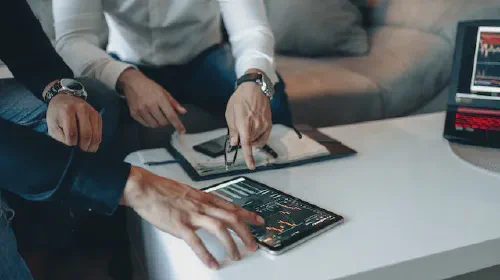What A Pending Blockchain Transaction Means
Salomon Kisters
Aug 10, 2023This post may contain affiliate links. If you use these links to buy something we may earn a commission. Thanks!
In the world of blockchain technology, transactions are at the heart of it all.
They are the building blocks that allow cryptocurrencies and other digital assets to move from one party to another in a secure and transparent manner.
But what happens when a transaction is marked as “pending”?
In this blog post, we will delve into the intricacies of pending blockchain transactions and demystify what it means for you as a user.
An Overview of Pending Transactions
When you initiate a transaction on a blockchain network, whether it’s sending or receiving digital assets, the transaction goes through a series of stages before it is confirmed and added to the blockchain. These stages include submission, verification, validation, and confirmation. During the verification and validation stages, the transaction is marked as “pending,” which indicates that it is awaiting further processing.
Why Transactions Get Marked as Pending
There are a few reasons why a blockchain transaction may become pending. Let’s explore some common scenarios:
Network Congestion
Blockchain networks can sometimes become congested due to high transaction volumes. Similar to rush hour traffic, when there’s a significant influx of transactions, the network may struggle to process them all in a timely manner. As a result, your transaction may end up in a pending state until there is enough capacity to handle it.
Insufficient Transaction Fee
In some blockchain networks, users have the option to attach a transaction fee to their transactions. This fee serves as an incentive for miners to prioritize the transaction and include it in the next block. If your transaction fee is too low, miners may prioritize other transactions with higher fees, causing yours to be delayed and marked as pending.
Network Synchronization
In decentralized blockchain networks, all nodes need to maintain a synchronized view of the blockchain. If there are discrepancies or delays in this synchronization process, it can result in pending transactions until the network reaches a consensus on the state of the blockchain.
What to Do When Your Transaction is Pending
Having a pending transaction can be a cause for concern, especially if it involves a significant amount of digital assets. However, there are a few steps you can take to address the situation:
Check the Transaction Status
The first thing you should do is check the status of your pending transaction. Most blockchain networks provide explorers or trackers that allow you to search for your transaction using its unique transaction ID or public key. By inputting the relevant information, you can get real-time updates on the progress of your transaction.
Be Patient
While it’s understandable to feel anxious about a pending transaction, patience is key in the world of blockchain. Depending on the factors mentioned earlier, it could take anywhere from a few minutes to several hours for your transaction to be confirmed. Panic-selling or attempting to cancel the transaction prematurely may cause unnecessary complications.
Consider a Higher Transaction Fee
If you suspect that your transaction is taking longer due to a low transaction fee, you may have the option to speed up the process by increasing the fee. This can incentivize miners to prioritize your transaction and push it through the verification and validation stages faster. However, be mindful of the fee structure and ensure that it is reasonable given the current network conditions.
Contact Support if Necessary
If your transaction has been pending for an unusually long period or if there are other issues that you suspect may be causing the delay, it may be worth reaching out to the support team of the blockchain network or platform you are using. They can provide insights into the specific circumstances surrounding your pending transaction and offer guidance on how to proceed.
The Implications of Pending Transactions
While pending transactions can be a temporary inconvenience, it’s important to understand their implications:
Transaction Reversibility
During the pending state, transactions are not yet finalized or irreversible. If you change your mind or need to modify certain details of the transaction, it may still be possible to do so. Once the transaction is confirmed and added to the blockchain, it becomes significantly harder to reverse or alter.
Account Balances
Until your transaction is confirmed and added to the blockchain, the digital assets involved in the transaction may not be reflected in the recipient’s account balance. Similarly, your account balance may not fully account for the funds being sent until the transaction is effectively completed. It’s crucial to keep track of pending transactions to avoid miscalculations or overdrawing funds.
Conclusion
Pending blockchain transactions are a common occurrence in the fast-paced world of cryptocurrencies and digital assets.
Understanding the reasons behind these pending transactions and knowing what steps to take can help alleviate concerns and ensure smooth interactions with the blockchain.
So, the next time you encounter a pending transaction, remember to be patient, verify the status, and, if necessary, take appropriate action to expedite the confirmation process.
By staying informed and proactive, you can navigate the world of blockchain transactions with confidence and peace of mind.
Stay informed with the latest insights in Crypto, Blockchain, and Cyber-Security! Subscribe to our newsletter now to receive exclusive updates, expert analyses, and current developments directly to your inbox. Don't miss the opportunity to expand your knowledge and stay up-to-date.
Love what you're reading? Subscribe for top stories in Crypto, Blockchain, and Cyber-Security. Stay informed with exclusive updates.
Please note that the Content may have been generated with the Help of AI. The editorial content of OriginStamp AG does not constitute a recommendation for investment or purchase advice. In principle, an investment can also lead to a total loss. Therefore, please seek advice before making an investment decision.

Screen Time and Kids: An Ethical Dilemma
Discover the ethical dilemma that arises with screen time and kids. Explore the impact of excessive screen time on children and the various perspectives on the issue in this informative blog post.

Kraken vs. Crypto.com - Which Is Better and Why?
Learn the differences of Kraken and Crypto.com, what these exchanges do, how they operate, and their respective products and services.

Edge Computing vs. Cloud Computing: Understanding the Contrasts
Edge computing and cloud computing are two distinct paradigms for data processing and storage, each with unique benefits and considerations. Understanding the differences can help you make informed decisions for your business.
Protect your documents
Your gateway to unforgeable data. Imprint the authenticity of your information with our blockchain timestamp